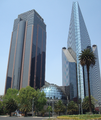The Business and Economics Portal Business is the practice of making one's living or making money by producing or buying and selling products (such as goods and services). It is also "any activity or enterprise entered into for profit." A business entity is not necessarily separate from the owner and the creditors can hold the owner liable for debts the business has acquired. The taxation system for businesses is different from that of the corporates. A business structure does not allow for corporate tax rates. The proprietor is personally taxed on all income from the business. A distinction is made in law and public offices between the term business and a company such as a corporation or cooperative. Colloquially, the terms are used interchangeably. (Full article...) Economics (/ˌɛkəˈnɒmɪks, ˌiːkə-/) is a social science that studies the production, distribution, and consumption of goods and services. Economics focuses on the behaviour and interactions of economic agents and how economies work. Microeconomics analyses what is viewed as basic elements within economies, including individual agents and markets, their interactions, and the outcomes of interactions. Individual agents may include, for example, households, firms, buyers, and sellers. Macroeconomics analyses economies as systems where production, distribution, consumption, savings, and investment expenditure interact, and factors affecting it: factors of production, such as labour, capital, land, and enterprise, inflation, economic growth, and public policies that have impact on these elements. It also seeks to analyse and describe the global economy. (Full article...) Selected article General Motors Company (GM) is an American multinational automotive manufacturing company headquartered in Detroit, Michigan, United States. The company is most known for owning and manufacturing four automobile brands: Chevrolet, GMC, Cadillac, and Buick. By terms of sales, it was the largest automaker in the United States in 2022, and was the largest in the world for 77 years before losing the top spot to Toyota in 2008. General Motors operates manufacturing plants in eight countries. In addition to its four core brands, GM also holds interests in Chinese brands Baojun and Wuling via SAIC-GM-Wuling Automobile. GM further owns the BrightDrop delivery vehicle manufacturer, a namesake defense vehicles division which produces military vehicles for the United States government and military, the vehicle safety, security, and information services provider OnStar, the auto parts company ACDelco, a namesake financial lending service, and majority ownership in the self-driving cars enterprise Cruise LLC. Selected image
Selected economyThe economy of Greece is the 54th largest in the world, with a nominal gross domestic product (GDP) of $250.276 billion per annum. In terms of purchasing power parity, Greece is the world's 55th largest economy, at $430.125 billion per annum. As of 2023, Greece is the sixteenth largest economy in the European Union and eleventh largest in the eurozone. According to the International Monetary Fund's figures for 2024, Greece's GDP per capita is $23,966 at nominal value and $41,188 at purchasing power parity. Among OECD nations, Greece has a highly efficient and strong social security system; social expenditure stood at roughly 24.1% of GDP. Greece is a developed country with an economy based on the service (80%) and industrial sectors (16%), with the agricultural sector contributing an estimated 4% of national economic output in 2017. Important Greek industries include tourism and shipping. With 31.3 million international tourists in 2019, Greece was the 7th most visited country in the European Union and 13th in the world. marking a steady increase from 18 million tourists in 2013. The Greek Merchant Navy is the largest in the world, with Greek-owned vessels accounting for 21% of global deadweight tonnage as of 2021; The total capacity of the Greek-owned fleet has increased by 45.8% compared to 2014. The increased demand for international maritime transportation between Greece and Asia has resulted in unprecedented investment in the shipping industry. (Full article...) Selected quote"Consider the nature of past wars. The twentieth century was not the deadliest (in percentage of the total population), but it brought something new: the beginning of the Extremistan warfare-a small probability of a conflict degenerating into total decimation of the human race, a conflict which nobody is safe anywhere. A similar effect is taking place in economic life. I spoke about globalization in Chapter 3, it is here, but it is not all for the good: it creates interlocking fragility, while reducing volatility and giving the appearance of stability. In other words it creates devastating Black Swans. We have never lived before under the threat of a global collapse. Financial institutions have been merging into a smaller number of very large banks. Almost all banks are now interrelated. So the financial ecology is swelling into gigantic, incestuous, bureaucratic banks (often Gaussianized in their risk measurement)-when one falls, they all fall. The increased concentration among banks seems to have the effect of making financial crisis less likely, but when they happen they are more global in scale and hit us very hard. We have moved from a diversified ecology of small banks, with varied lending policies, to a more homogeneous framework of firms that all resemble one another. True, we now have fewer failures, but when they occur...I shiver at the thought. I rephrase here: we will have fewer but more severe crises. The rarer the event, the less we know about its odds. It means that we know less and less about the possibility of a crisis."
TopicsRelated WikiProjectsDid you know (auto-generated) -
On this day in business history
General imagesThe following are images from various business-related articles on Wikipedia.
More did you know
Business news
SubcategoriesRelated portals
Things you can doUrgent and important articles are bold
WikimediaThe following Wikimedia Foundation sister projects provide more on this subject:
SourcesDiscover Wikipedia using portals |






































